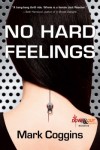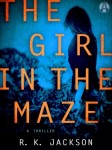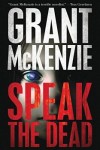

September 28 – October 4: “Must a thriller prompt fear in readers?”
 We’ve got a full house this week as ITW Members Lisa von Biela, R. K. Jackson, Grant McKenzie, Hester Young, Baron R. Birthcher, D. D. Ayres and Mark Coggins discuss whether or not a thriller must prompt fear in readers. Can a plot work without that emotion?
We’ve got a full house this week as ITW Members Lisa von Biela, R. K. Jackson, Grant McKenzie, Hester Young, Baron R. Birthcher, D. D. Ayres and Mark Coggins discuss whether or not a thriller must prompt fear in readers. Can a plot work without that emotion?
~~~~~
 Lisa von Biela began writing dark fiction just after the turn of the century. Her very first short story appeared in The Edge in 2002. After working in IT for 25 years, Lisa dropped out of everything—including writing—to attend the University of Minnesota Law School. She graduated magna cum laude in 2009, and now practices law and writes in the Seattle area. On the writing front, she’s made up for lost time since law school and is now the author of the novels THE GENESIS CODE, THE JANUS LEGACY, BLOCKBUSTER, and BROKEN CHAIN, as well as the novellas ASH AND BONE and SKINSHIFT.
Lisa von Biela began writing dark fiction just after the turn of the century. Her very first short story appeared in The Edge in 2002. After working in IT for 25 years, Lisa dropped out of everything—including writing—to attend the University of Minnesota Law School. She graduated magna cum laude in 2009, and now practices law and writes in the Seattle area. On the writing front, she’s made up for lost time since law school and is now the author of the novels THE GENESIS CODE, THE JANUS LEGACY, BLOCKBUSTER, and BROKEN CHAIN, as well as the novellas ASH AND BONE and SKINSHIFT.
 Baron R. Birtcher spent a number of years as a professional musician, and founded an independent record label and management company. Critics have hailed his writing as “The real deal” (Publishers Weekly) and his plots as “Taut, gritty and powerfully controlled” (Kirkus Reviews). His first two Mike Travis novels, Roadhouse Blues and Ruby Tuesday were Los Angeles Times and IMBA bestsellers. Angels Fall, the third installment of the acclaimed series, was nominated for the “Lefty” Award by Left Coast Crime. Rain Dogs, his first stand-alone, was nominated for both the Claymore and Silver Falchion Awards.
Baron R. Birtcher spent a number of years as a professional musician, and founded an independent record label and management company. Critics have hailed his writing as “The real deal” (Publishers Weekly) and his plots as “Taut, gritty and powerfully controlled” (Kirkus Reviews). His first two Mike Travis novels, Roadhouse Blues and Ruby Tuesday were Los Angeles Times and IMBA bestsellers. Angels Fall, the third installment of the acclaimed series, was nominated for the “Lefty” Award by Left Coast Crime. Rain Dogs, his first stand-alone, was nominated for both the Claymore and Silver Falchion Awards.
 Mark Coggins’ work has been nominated for the Shamus and the Barry crime fiction awards and selected for best of the year lists compiled by the San Francisco Chronicle, the Detroit Free Press and Amazon.com, among others. His novels Runoff and The Big Wake-Up won the Next Generation Indie Book Award and the Independent Publisher Book Award (IPPY) respectively, both in the crime fiction category. The Immortal Game was optioned for a film.
Mark Coggins’ work has been nominated for the Shamus and the Barry crime fiction awards and selected for best of the year lists compiled by the San Francisco Chronicle, the Detroit Free Press and Amazon.com, among others. His novels Runoff and The Big Wake-Up won the Next Generation Indie Book Award and the Independent Publisher Book Award (IPPY) respectively, both in the crime fiction category. The Immortal Game was optioned for a film.
 R. K. Jackson is a former CNN journalist who now works at the Jet Propulsion Laboratory in Pasadena, California. He lives with his family in the Los Padres National Forest and is at work on a second Martha Covington thriller.
R. K. Jackson is a former CNN journalist who now works at the Jet Propulsion Laboratory in Pasadena, California. He lives with his family in the Los Padres National Forest and is at work on a second Martha Covington thriller.
 Grant McKenzie is the internationally published author of four edge-of-your-seat thrillers, plus an ongoing mystery series set in San Francisco. His riveting thrillers The Fear in Her Eyes, Switch, and K.A.R.M.A. are also available from Polis Books. Under the pen name M. C. Grant he writes the Dixie Flynn series that began with Angel With a Bullet, continued with Devil With a Gun, and returns with Baby With a Bomb. His short story “Underbelly” appeared in the First Thrills anthology edited by Lee Child from Tor/Forge. As a journalist, Grant has worked in virtually every area of the newspaper business, from the late-night “Dead Body Beat” at a feisty daily tabloid to senior copy/design editor at two of Canada’s largest broadsheets and editor in chief of Monday magazine. He lives in Victoria, British Columbia.
Grant McKenzie is the internationally published author of four edge-of-your-seat thrillers, plus an ongoing mystery series set in San Francisco. His riveting thrillers The Fear in Her Eyes, Switch, and K.A.R.M.A. are also available from Polis Books. Under the pen name M. C. Grant he writes the Dixie Flynn series that began with Angel With a Bullet, continued with Devil With a Gun, and returns with Baby With a Bomb. His short story “Underbelly” appeared in the First Thrills anthology edited by Lee Child from Tor/Forge. As a journalist, Grant has worked in virtually every area of the newspaper business, from the late-night “Dead Body Beat” at a feisty daily tabloid to senior copy/design editor at two of Canada’s largest broadsheets and editor in chief of Monday magazine. He lives in Victoria, British Columbia.
 Hester Young holds a master’s degree in English with a creative writing concentration from the University of Hawaii at Manoa, and her short stories have appeared in magazines such as Hawai‘i Review. Before turning to writing full-time, she worked as a teacher in Arizona and New Hampshire. Young lives in Lawrenceville, New Jersey, with her husband and their two children.
Hester Young holds a master’s degree in English with a creative writing concentration from the University of Hawaii at Manoa, and her short stories have appeared in magazines such as Hawai‘i Review. Before turning to writing full-time, she worked as a teacher in Arizona and New Hampshire. Young lives in Lawrenceville, New Jersey, with her husband and their two children.
 A veteran author of romance and women’s fiction, D.D. Ayres is new to Romantic Suspense. She believes the lure of romance is always the human connection. Put that connection in physical jeopardy, and and we learn a bit moreabout who we really are. With her K-9 Rescue series, D.D. hopes you will enjoy her sexy, suspenseful portrayals of K-9 teams at their best. D.D. lives in Texas with her husband and a soft-coated Wheaten terrier named Zoe.
A veteran author of romance and women’s fiction, D.D. Ayres is new to Romantic Suspense. She believes the lure of romance is always the human connection. Put that connection in physical jeopardy, and and we learn a bit moreabout who we really are. With her K-9 Rescue series, D.D. hopes you will enjoy her sexy, suspenseful portrayals of K-9 teams at their best. D.D. lives in Texas with her husband and a soft-coated Wheaten terrier named Zoe.
- LAST GIRL MISSING with K.L. Murphy - July 25, 2024
- CHILD OF DUST with Yigal Zur - July 25, 2024
- THE RAVENWOOD CONSPIRACY with Michael Siverling - July 19, 2024
